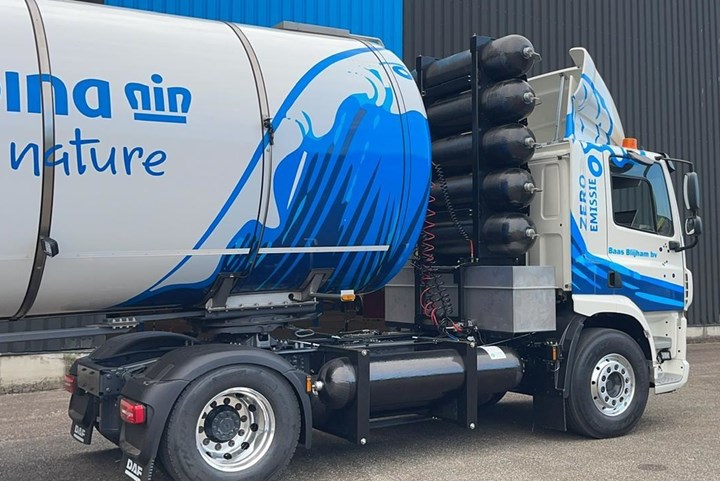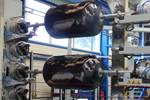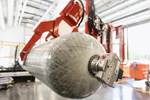Hyzon Motors unveils new hydrogen storage system using composites for reduced weight and cost
Integrated composites with metal frame could cut storage system weight by 43%, cost by 52% and component count by 75%, based on a single-rack system with five hydrogen cylinders.

Hyzon Motors produces hydrogen tank storage systems for its fuel cell-powered commercial vehicles. Photo Credit: Hyzon Motors
Hyzon Motors Inc. (Rochester, N.Y., U.S.), a leading global supplier of zero-emission hydrogen fuel cell-powered commercial vehicles, announced it has developed a new onboard hydrogen storage system technology capable of reducing the weight and manufacturing cost of commercial vehicles powered by Hyzon’s hydrogen fuel cells.
The patent-pending onboard hydrogen storage system technology integrates lightweight composite materials with the system’s metal frame. It reportedly has the potential to reduce the overall weight of the system by 43%, storage system costs by 52% and the required manufacturing component count by 75%, based on a single-rack system with capacity to store five hydrogen cylinders.
In addition to reducing the weight and costs, Hyzon says the new storage system can be configured to hold varying numbers of hydrogen tanks. The smallest version can hold five tanks and can be extended to seven tanks because of its modular design. A separate version can hold 10 tanks, appropriate for trucks driving longer distances.
While these configurations are mounted completely behind the cab, another configuration allows for an additional two tanks to be mounted to each side of the truck, extending the vehicle’s range without diminishing the size of the trailer.
The development of this technology was a cross-Atlantic collaboration between Hyzon’s European and U.S. teams, with the company planning to produce this new system in both its Rochester, N.Y., and Groningen, Netherlands, facilities. The technology will be implemented in Hyzon’s vehicles world-wide.
Hyzon also expects to license this new system to other commercial vehicle companies. As part of the Hyzon Zero Carbon Alliance, a global consortium of companies active along the hydrogen value chain, original equipment manufacturers (OEMs) are expected to have access to the technology.
“Hyzon is committed to continuous innovation in our zero-emission commercial vehicles, down to every detail, enabling our customers to make the switch to hydrogen from diesel without compromise,” says CEO Craig Knight. “After years of research and development alongside our partners, this new storage technology further optimizes the building cost of our hydrogen fuel cell-powered commercial vehicles, while reducing overall weight and increasing mileage capabilities. This makes Hyzon vehicles an even more attractive alternative to heavy vehicles powered by combustion engines.”
The technology already has been installed in pilot trucks in Europe and is expected to be deployed across all vehicles beginning in Q4 2021.
Related Content
-
The potential for thermoplastic composite nacelles
Collins Aerospace draws on global team, decades of experience to demonstrate large, curved AFP and welded structures for the next generation of aircraft.
-
McLaren celebrates 10 years of the McLaren P1 hybrid hypercar
Lightweight carbon fiber construction, Formula 1-inspired aerodynamics and high-performance hybrid powertrain technologies hallmark this hybrid vehicle, serve as a springboard for new race cars.
-
Welding is not bonding
Discussion of the issues in our understanding of thermoplastic composite welded structures and certification of the latest materials and welding technologies for future airframes.










.jpg;maxWidth=300;quality=90)




